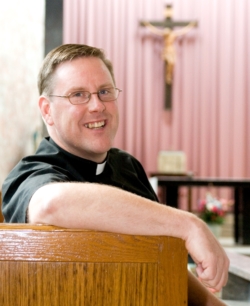Ministering to the ministers
BRIGHTON — The Boston Archdiocese’s Office for Clergy Support and Ongoing Formation has undergone several changes in the last two years, including a new director, new name and new location, but its mission has remained consistent — ministering to those who have devoted their lives to ministering to others.
The office organizes workshops, opportunities for prayer and annual retreats and seeks to support archdiocesan clergy. It also reaches out to priests who are facing transition or difficult circumstances, supports those priests who are not on active duty and organizes events for prayer and fraternity among priests and deacons.
“That’s why the office exists — to help men become better priests and deacons,” said Father William Kelly, who became director in June 2005.
The office serves about 500 active and 200 retired priests and priests on leave. In addition, about 250 permanent deacons, who were previously supported by the permanent diaconate program are now served by Father Kelly’s office.
“Because they are clergy, they should be involved with this office. It’s worked out very well,” Father Kelly said.
The Office for Clergy Support and Ongoing Formation was first formed in 1967 in response to Vatican II documents on priestly life, which “spoke about the need for continual pastoral care of priests and their ongoing formation,” according to Father Kelly.
The United States Conference of Catholic Bishops has also built on those themes through the years, in particular by publishing “The Basic Plan for the Ongoing Formation of Priests” in 2001, he said.
Father Kelly’s office falls under the auspices of Father Arthur Coyle, head of the newly created cabinet office, Pastoral and Ministerial Services. Once called the Pastoral Institute and located at St. William Hall, the new office now occupies three rooms in Peterson Hall at St. John’s Seminary: a meeting room and offices for two full-time staffers, Father Kelly and Ruth Cox.
According to Father Kelly, Cardinal Seán P. O’Malley’s decision to maintain a full-time clergy support staff demonstrates his deep care for priests and deacons. He said it is “significant” that almost no other diocese in the United States has a full-time employee in that role.
Father Kelly, who for the last decade was on the faculty at St. John’s, moved when he came to the Office for Clergy Support and Ongoing Formation and now lives at Blessed Mother Teresa Parish in Dorchester.
Father Kelly said he decided very early in his tenure to entrust the care of the office to Pope John Paul II, who had recently died, and Blessed Mother Teresa of Calcutta.
Mother Teresa had a “tremendous love for priests and those in ordained ministry” and a major part of Pope John Paul’s pontificate was “a renewal of the identity of the priest,” he said.
In 1992 Pope John Paul wrote a pastoral letter entitled “Pastores Dabo Vobis” (“I Will Give You Shepherds”) which outlined four pillars of ongoing formation. The pope affirmed that priests must both understand the roots of their ministry and continue moving forward. They must develop skills as well as their relationship with Christ, Father Kelly said.
“It’s an understanding that, once a man is ordained, he is constantly both going deeper into what it means to be ordained and then growing in formation,” Father Kelly said. “It is about being nurtured so that we can go back and continue to serve.”
The pillars outlined by Pope John Paul are spiritual, pastoral, human and intellectual formation. Father Kelly plans events that help build each. He organizes holy hours and evenings of prayer for spiritual formation. This year priests are undergoing training to work in the post-abortion ministry of Project Rachel for pastoral formation. Father Kelly also hosts workshops on counseling skills for human formation. The office also sponsors Scripture lectures on topics like the difference between faith and reason for intellectual formation, he said.
The office also organizes the annual retreats that diocesan priests are required by Canon Law to take. The retreats last five days, present talks each day and give priests the opportunity for silent prayer, adoration, confession as well as fraternity, he said.
“There’s a recognition that for a priest continuing his work, he has to continue to go back to the place of his love,” Father Kelly said. “The place of his love is Christ.”
Priests, in particular because of their call to celibacy, must seek quiet and solitude with Christ so that their faith will be “burning and alive,” he said.
The Clergy Support Office also organizes seven meetings per year for priests who have been ordained for fewer than five years in an effort to support them through the transition from a student to part of the presbyterate. Four of those meetings are prayer and conversation with Cardinal O’Malley and the other three are talks by Father Kelly or guest speakers.
The office is also developing new programs in collaboration with other organizations. Six priests from the archdiocese will be participating in the program “Good Leaders, Good Shepherds” with the national Catholic Leadership Institute. Regional workshops on pro-life issues are being organized now in conjunction with the Pro-life Office and the Secretary for Regional Services, Sister Marian Batho, CSJ.
Father Kelly is continually seeking new ways to make the office a place where priests and deacons can be strengthened in their ministry. The office seeks to help them get at the heart of what they are called to do — preach Jesus Christ — and help them to build fraternity, he said.
Fraternity for priests is especially important after the recent history in the archdiocese, he added.
“The men have been through a lot in the past four years since the crisis and though there is a weariness, there is a real desire among most for a renewal in the priesthood,” he said.



















